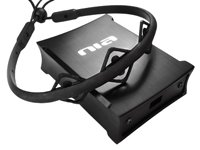OCZ Neural Impulse Actuator
It's all in your head

"I just killed with my mind," Padawan learner Norman Chan uttered, mouth agape. That's the same response I had, word for word, less than five minutes after I slipped the Neural Impulse Actuator on my head, did some basic calibration, and leapt right into Unreal Tournament 3. "Astonishing" isn't the word for it. Astonishing is what you'd call a chicken that can play the violin. This is something else. This is heaven.
Comprised of a light, rubbery headband and a pocket-sized USB-connected external box, the NIA monitors the electrical activity in your brain and the muscles in your head and uses algorithms to translate this activity into commands: "If X area of the brain lights up, do Y. If this muscle contracts, do Z." That's the short version. The first time you use the NIA in a game, it's a struggle to make your first movement, but then you twitch forward, accidentally fire your weapon, and twitch backward again as you create a feedback loop between yourself and the NIA. Eventually, you figure out how to move in all directions - it happens instinctively and, paradoxically, when you stop struggling to make it happen. (In Unreal Tournament 3, you still use the mouse to look, but use the NIA to move and fire weapons.) The more you use the system, the further it can tailor its algorithms to understand your intentions, and the more reliable it becomes.

And yes, it works. With some family-sized caveats. Many PC Gamer guinea pigs testers were unimpressed, convinced that the NIA merely monitored "brow-furrowing," although even they acknowledged that they were doing rudimentary tasks without any training at all. And it does require a lot of training before you can be a serious contender in deathmatch - a point I'm far from reaching after one week (check out the video clip!). But I'm going to keep at it, because I've already killed scores of UT3 bots Predator-style, raining death down on their little poly heads with nothing more than a glance.
Sign up to the GamesRadar+ Newsletter
Weekly digests, tales from the communities you love, and more


